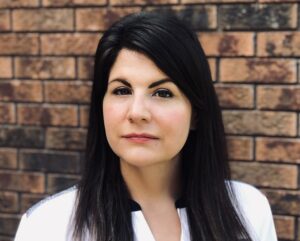Red Rock Indian Band’s Lana Ray begins new role as Lakehead University’s inaugural Indigenous research chair in Decolonial Futures

By Rick Garrick
THUNDER BAY — Red Rock Indian Band’s Lana Ray is looking forward to additional support and research opportunities in her new role as Lakehead University’s inaugural Indigenous research chair in Decolonial Futures. Ray, an assistant professor in Indigenous Learning at Lakehead University who has more than a decade of experience working with Indigenous peoples and communities to implement Indigenous community-based approaches to research, begins her five-year term as chair on July 1.
“For my individual research portfolio that I have, this really allows me to carry on that work with more supports and expand it a bit as well,” Ray says. “In terms of projects, that’s done collaboratively, so it will provide opportunities too for training for undergraduate students, graduate students, and I’m hoping predominately Indigenous undergraduate students and graduate students.”
Ray says the students will have the opportunity to gain “a really meaningful learning experience” and to receive a stipend for the work they do, which will help support their academic careers.
“So I’m hoping as part of this chairship we’ll see the return on it in terms of supporting a next generation of Indigenous scholars who could hopefully then take up positions at Lakehead University and elsewhere and also within their own communities too,” Ray says.
Ray says the newly-created Lakehead University Indigenous Research Chairship program is an example of what reconciliation can look like, noting that universities must extend their role in reconciliation beyond truth-seeking and public education to actively supporting processes of decolonization and Indigenous self-determination.
“As the inaugural Indigenous research chair, I will be provided with the resources I need to carry out research within my own territory as an Anishinabe ikwe, who privileges Indigenous ways of knowing and doing, serves the interests of Anishinabe communities and forwards decolonial futures,” Ray said. “[Decolonial futures are those in which] Anishinabe people can proudly and freely live our knowledge systems and enact our sacred responsibilities.”
Ray says the second part of her new role is to work on creating a university-based center for research and scholarship with an Indigenous and international focus.
“It’s really in its early stages and a lot of community engagement will be required to be at a point where it is operational,” Ray says. “I see one purpose of the research center is really to be a hub to support networks and mobilization among Indigenous people, both locally [and] internationally as well.”
Ray plans to continue to develop projects that strengthen local and international Indigenous research networks, build Indigenous research infrastructure, and design Indigenous-driven research standards.
“Over the next five years, I will continue my work to advance Indigenous concepts of health and wellness that emphasize relationships with land and work to rightfully position Indigenous peoples as the keepers and authorities of our own knowledges and experiences,” Ray says.
Ray was recently recognized with the Emerging Voices in Indigenous Scholarship/Researcher Award by the Indigenous Inquiries Circle Awards Committee on May 18 at the 17th International Congress of Qualitative Inquiry. The international award recognizes outstanding Indigenous scholarship being done by Indigenous scholars and researchers around the world.
“I was really honoured to be able to receive that [award],” Ray says. “It’s predominantly Indigenous scholars who nominate and adjudicate that committee.”
Ray has led a number of research projects in the areas of health and education, including as principal investigator for the CIHR funded Investigating Food Sovereignty as a Best Practice Framework for Health Interventions in Rural and Urban Hubs in Northern Ontario project and as co-principal investigator for the five-year CIHR funded Educating for Equity: Building Culturally Safe Care through Indigenous Narratives project.


